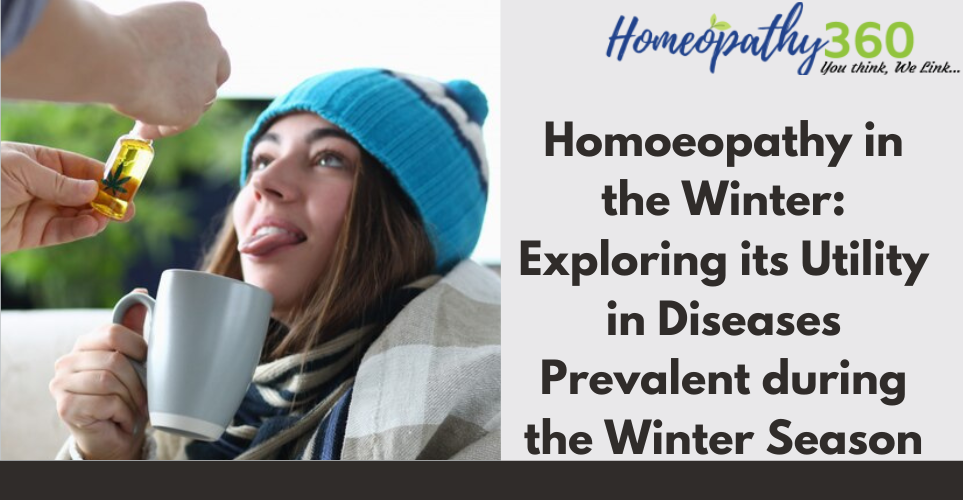
Homoeopathy in the Winter: Exploring its Utility in Diseases Prevalent during the Winter Season
Abstract
The winter season brings relief from the scorching heat, but also ushers in a host of diseases. Homoeopathy, a holistic system of medicine, offers a ray of hope in combating these ailments. This article delves into the utility of homoeopathy in diseases prevalent during the winter weather, such skin disease , joint pain ,respiratory infections. We examine the homoeopathic approach to these conditions, highlighting the remedies and their applications. By exploring the potential of homoeopathy in addressing winter -related diseases, we aim to provide a comprehensive understanding of its role in promoting health and wellness during this season.
Keywords: Homoeopathy, winter weather, winter diseases, Respiratory, infections skin disease .
Introduction
The winter season, while bringing respite from the heat, also brings a host of diseases that can wreak havoc on our health. The increased moisture and humidity create an ideal breeding ground for respiratory infections. Homoeopathy, with its holistic approach to health, offers a promising solution to these ailments. By understanding the homoeopathic perspective on these diseases and the remedies used to treat them, we can better equip ourselves to face the health challenges posed by the winter weather.
The diseases commonly seen during winter season are:
Respiratory Issues
- Common Cold: A viral infection that affects the upper respiratory tract.
- Influenza (Flu): A contagious respiratory illness caused by the influenza virus.
- Bronchitis: An inflammation of the bronchial tubes, often caused by a viral or bacterial infection.
- Pneumonia: A serious infection of the lungs, often caused by bacteria or viruses.
- Asthma: A chronic respiratory condition that can be exacerbated by cold air and viral infections.
Skin Issues
- Dry Skin (Xerosis): A common condition caused by low humidity and cold temperatures.
- Eczema (Atopic Dermatitis): A chronic skin condition that can be exacerbated by cold weather.
- 3. Psoriasis: A chronic autoimmune condition that can be triggered by cold temperatures.
Joint and Muscle Issues
- Arthritis: A chronic condition that causes joint pain and inflammation, often exacerbated by cold temperatures.
- Fibromyalgia: A chronic condition characterized by widespread muscle pain and fatigue.
- Muscle Cramps: A common condition caused by cold temperatures, dehydration, and electrolyte imbalances.
Other Issues
- Hypothermia: A life-threatening condition caused by prolonged exposure to cold temperatures.
- Frostbite: A condition caused by freezing temperatures, resulting in damage to skin and underlying tissues.
- Seasonal Affective Disorder (SAD): A type of depression that occurs during the winter months due to lack of sunlight.
Here are some specific homoeopathic medicines with brief information about the diseases of winter weather:
Respiratory Issues
- Aconitum napellus: For colds, flu, and bronchitis, especially when symptoms come on suddenly.
- Bryonia alba: For dry, hacking coughs and bronchitis.
- Eucalyptus globulus: For congestion, coughs, and colds.
- Gelsemium sempervirens: For flu, fatigue, and headaches.
- Oscillococcinum: For flu, fever, and body aches.
Skin Issues
- Graphites: For dry, cracked skin and eczema.
- Petroleum: For dry, chapped skin and lips.
- Calendula: For skin irritations, wounds, and dry skin.
Joint and Muscle Issues
- Rhus toxicodendron: For arthritis, joint pain, and stiffness.
- Ledum palustre: For joint pain, swelling, and stiffness.
- Arnica montana: For muscle pain, stiffness, and bruising.
Other Issues
- Hypothermia: Aconitum napellus, Arnica montana, and Veratrum album.
- Frostbite: Hypericum perforatum, Ledum palustre, and Calendula.
- Seasonal Affective Disorder (SAD): Aurum metallicum, Natrum muriaticum, and Helios.
Preventive Measures
- Influenzinum: For flu prevention.
- Pneumococcinum: For pneumonia prevention.
- Tuberculinum: For tuberculosis prevention
Conclusion
Homoeopathy offers a valuable approach to addressing the diseases prevalent during the winter weather. By understanding the underlying principles and remedies used in homoeopathy, we can effectively manage and prevent these ailments. As we embrace the winter season, let us also embrace the potential of homoeopathy in promoting health and wellness. With its emphasis on natural remedies and holistic healing, homoeopathy is an invaluable tool in our quest for a healthier tomorrow. Homoeopathy, with its holistic approach to health, offers a comprehensive solution to these winter -related diseases. By understanding the underlying principles and remedies used in homoeopathy, we can effectively manage and prevent these ailments, ensuring a healthier winter season.
Author
Dr Praveen Jaiswal MD (HOMO)Prof & HOD Department Practice Of Medicine ,Govt. Homeo.Medical College Bhopal Madhya Pradesh.





